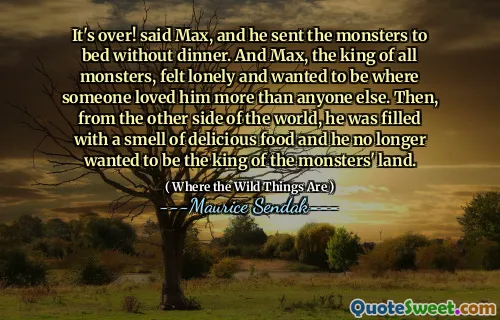
It's over! said Max, and he sent the monsters to bed without dinner. And Max, the king of all monsters, felt lonely and wanted to be where someone loved him more than anyone else. Then, from the other side of the world, he was filled with a smell of delicious food and he no longer wanted to be the king of the monsters' land.
This quote from Maurice Sendak's 'Where the Wild Things Are' beautifully captures the complex emotions of loneliness and longing that can accompany power and control. Max initially asserts his authority over the monsters, sending them to bed and declaring himself king, a symbol of a desire to be in charge and perhaps escape feelings of insignificance or loneliness. Yet, the narrative deepens as Max recognizes the emptiness that can accompany such dominance. Despite being king of the monsters, he feels isolated, craving connection and affection—fundamental human needs that transcend titles and control.
The turning point comes with the scent of delicious food from afar, pulling Max back from his imagined realm of domination into the reality of longing for love and belonging. Food, often a symbol of nourishment and comfort, signifies warmth, care, and human connection, reminding us that no matter how powerful we may believe ourselves to be, our true fulfillment comes from meaningful relationships.
This excerpt resonates with anyone who has experienced the desire to feel loved and validated. It underscores that true happiness isn't found in power or control but in shared vulnerability and warmth. Max’s journey illustrates a universal truth: that beneath our exterior roles—be they kings, leaders, or monsters—lies an innate need for love and acceptance. Recognizing this need helps us understand the importance of empathy and kindness in fostering genuine connection, reminding us that even those who project strength might secretly yearn for reassurance and companionship.
Maurice Sendak's story elegantly captures these themes through a child's perspective, reminding readers of the importance of balancing authority with emotional openness.






